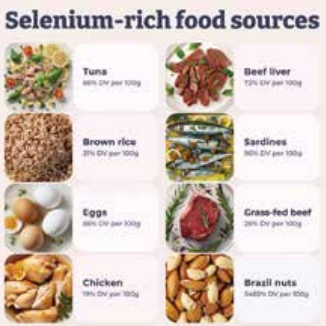
Selenium is a trace mineral, which means that the body only needs a small amount of it. It is found naturally in foods or as a supplement. Selenium plays an important role in thyroid function, such as antioxidant function and the metabolism of thyroid hormones.

This mineral is very important for the thyroid hormone metabolism. People who don’t get enough selenium may develop thyroid problems, such as hypothyroidism (underactive thyroid) and Graves’ disease. This mineral is extremely important in your thyroid gland’s ability to produce thyroid hormone. Your body does not produce selenium, so the only way you can get it is through food or supplements. A selenium deficiency is associated with a variety of thyroid issues: Hypothyroidism, subclinical hypothyroidism, autoimmune disease, an enlarged thyroid, and Graves’ disease.
There are reasons why you might not have enough selenium in your body: Crohn’s disease, gastric bypass surgery, deficient soil of selenium and kidney dialysis. Symptoms of these conditions include fatigue, hair loss, infertility, weight gain, and difficulty thinking or concentrating. Sources of selenium are Brazil nuts, eggs, seafood, grains, chicken and cereals. The Recommended Dietary Allowance (RDA) for adult men and women 19+ years of age is 55 micrograms daily. Women who are pregnant and lactating need about 60 and 70 micrograms daily, respectively.
– Patrica Chirino Cabrera

Leave a Reply